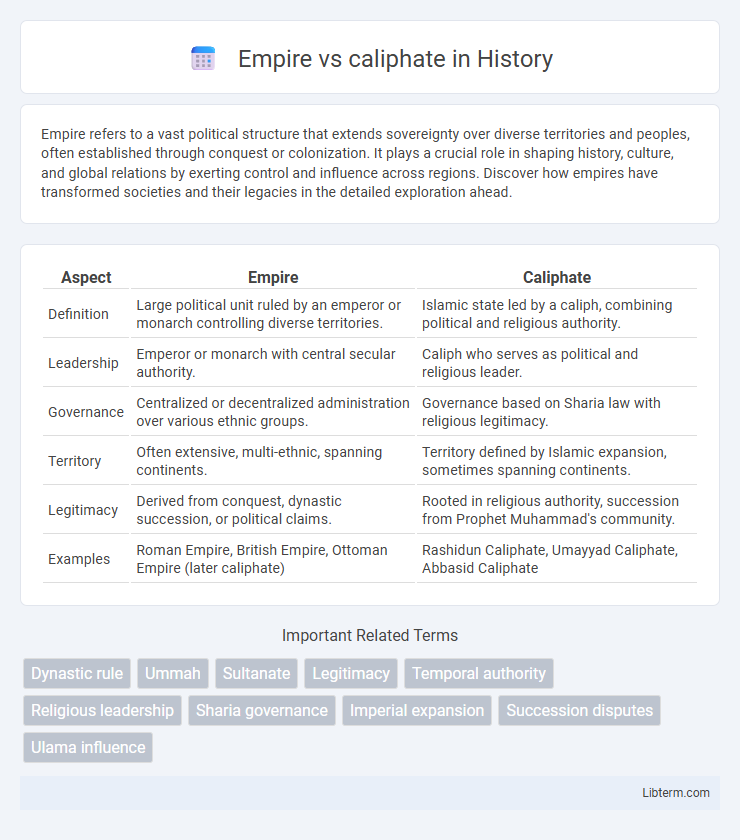Empire refers to a vast political structure that extends sovereignty over diverse territories and peoples, often established through conquest or colonization. It plays a crucial role in shaping history, culture, and global relations by exerting control and influence across regions. Discover how empires have transformed societies and their legacies in the detailed exploration ahead.
Table of Comparison
| Aspect | Empire | Caliphate |
|---|---|---|
| Definition | Large political unit ruled by an emperor or monarch controlling diverse territories. | Islamic state led by a caliph, combining political and religious authority. |
| Leadership | Emperor or monarch with central secular authority. | Caliph who serves as political and religious leader. |
| Governance | Centralized or decentralized administration over various ethnic groups. | Governance based on Sharia law with religious legitimacy. |
| Territory | Often extensive, multi-ethnic, spanning continents. | Territory defined by Islamic expansion, sometimes spanning continents. |
| Legitimacy | Derived from conquest, dynastic succession, or political claims. | Rooted in religious authority, succession from Prophet Muhammad's community. |
| Examples | Roman Empire, British Empire, Ottoman Empire (later caliphate) | Rashidun Caliphate, Umayyad Caliphate, Abbasid Caliphate |
Introduction: Defining Empire and Caliphate
An empire is a vast political structure characterized by extensive territories ruled by a single sovereign authority, often encompassing diverse populations and cultures under centralized control. A caliphate is a specific form of Islamic governance led by a caliph, who serves as both a political and religious leader, uniting Muslim communities under Sharia law. While empires emphasize territorial expansion and administrative dominance, caliphates focus on religious legitimacy and the implementation of Islamic principles across their domains.
Historical Origins and Evolution
Empires originated as large political entities dominated by a single sovereign power, often expanding through conquest and incorporating diverse populations, exemplified by examples such as the Roman and Ottoman Empires. Caliphates, rooted in Islamic history, emerged from the leadership of the Muslim community after Prophet Muhammad's death, with the Rashidun and Umayyad Caliphates shaping religious and political unity under Islamic law. The evolution of empires revolved around centralized authority and territorial expansion, while caliphates combined spiritual and temporal leadership, adapting to religious and cultural contexts across centuries.
Governance Structures and Leadership
Empires typically feature a centralized governance structure headed by an emperor who holds supreme authority, often supported by a bureaucratic system designed to manage vast territories and diverse populations. Caliphates operate under Islamic governance principles, with the caliph serving as both a political and religious leader, embodying the unity of state and faith while implementing Sharia law. The leadership in empires is often secular and dynastic, whereas caliphs derive legitimacy through religious authority and succession, influencing the governance model and legal frameworks.
Religious Authority and Influence
Empires often centralized religious authority under the state's control, integrating diverse faith practices to legitimize political power and reinforce governance. Caliphates specifically combined political and religious leadership in the figure of the caliph, who held supreme authority in both spiritual and administrative matters. This fusion of religious and political influence allowed caliphates to unify Islamic law (Sharia) with governance, shaping social and legal systems across their territories.
Administrative Systems and Territorial Control
Empires employ centralized administrative systems with hierarchical governance, utilizing bureaucracies to maintain control over vast, diverse territories. Caliphates integrate religious authority with governance, often relying on Sharia law and regional governors (emirs) to administer provinces while ensuring loyalty through religious legitimacy. Territorial control in empires emphasizes military conquest and infrastructure development, whereas caliphates prioritize the spread of Islamic law and cultural cohesion across their domains.
Cultural Integration and Diversity
Empires often achieved extensive cultural integration by incorporating diverse ethnic groups, languages, and religions into a centralized administrative system, facilitating trade, communication, and shared identity across vast territories. Caliphates emphasized the unifying role of Islam, promoting religious and legal cohesion while allowing local customs and traditions to persist, which fostered a unique blend of cultural diversity within an Islamic framework. Both structures managed diversity through strategies of governance and cultural accommodation, yet empires leaned more on political and economic integration, whereas caliphates centered on spiritual and religious unity.
Military Expansion and Strategies
Empires relied on well-organized standing armies, advanced siege technologies, and extensive supply chains to conquer and maintain vast territories, often integrating diverse troops and local auxiliaries into their forces. Caliphates emphasized rapid, mobile cavalry units, strategic alliances with tribal groups, and religious motivation to expand influence across arid regions and trade routes. Both employed psychological warfare and fortified cities, but caliphates combined military campaigns with missionary efforts to solidify control and spread Islamic governance.
Economic Foundations and Trade Networks
Empires and caliphates both developed complex economic foundations driven by agricultural productivity, tribute systems, and urban markets that supported state stability and expansion. Imperial economies often relied on diversified trade networks connecting multiple regions, facilitating the exchange of goods such as silk, spices, and precious metals along routes like the Silk Road, the Mediterranean, or Trans-Saharan trade corridors. Caliphates enhanced economic growth through the integration of Islamic law regulating commercial practices, promotion of caravan routes, and establishment of key port cities that boosted long-distance trade across the Middle East, North Africa, and beyond.
Decline and Transformation Over Time
Empires often experienced gradual decline due to administrative overreach, economic strain, and external invasions, leading to fragmented authority and loss of territorial control. Caliphates, such as the Umayyad and Abbasid, underwent transformation through decentralization and adoption of local customs, shifting from centralized rule to more regional powers. Both political structures adapted over time, with caliphates evolving into diverse Islamic states while many empires dissolved into successor kingdoms or were absorbed by emerging powers.
Legacy and Modern Interpretations
Empires and caliphates have left profound legacies shaping political, cultural, and religious landscapes globally. Empires often prioritized centralized governance and expansive territorial control, influencing modern nation-states' borders and administrative systems. Caliphates, rooted in Islamic governance, continue to impact contemporary interpretations of religious authority and Islamic identity in global geopolitics.
Empire Infographic

 libterm.com
libterm.com